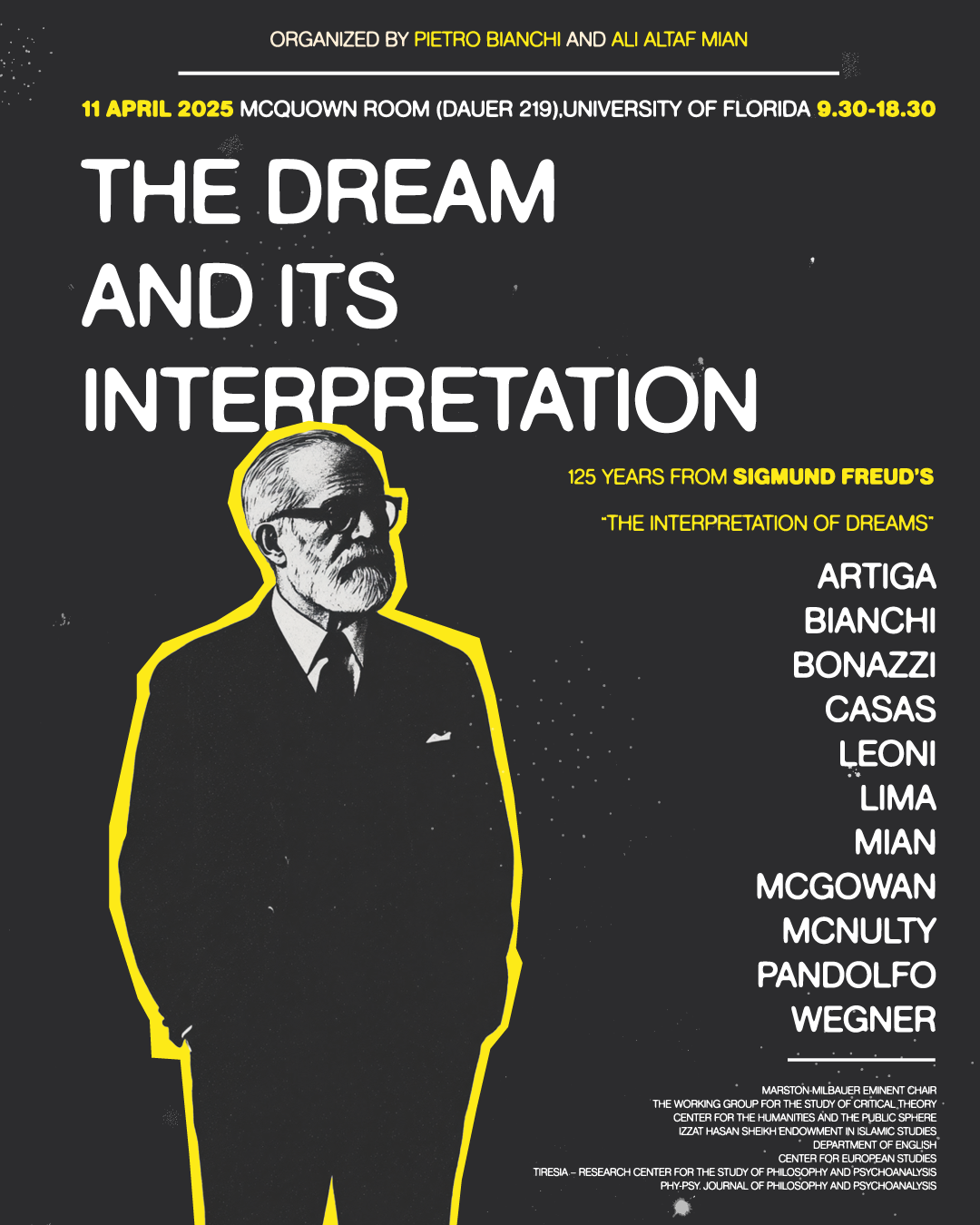
- This event has passed.
Conference: The Dream and Its Interpretation: 125 years from Sigmund Freud’s ‘The Interpretation of Dreams’
April 11, 2025
University of Florida, Dauer Hall 219 (McQuown Room)
9:30 am-6:30 pm
 125 years ago, in 1900, Sigmund Freud published The Interpretation of Dreams, a book that not only symbolized the birth of the 20th century but also inaugurated the field of psychoanalysis. Freud identified the dream as the primary entry point into the unconscious. Dreams, he proposed, were not merely hallucinatory wish-fulfillments but also linguistic expressions of distorted unconscious desires requiring interpretation: enigmatic questions directed at the individual. In this sense, the dream does not exist independently of interpretation; its significance lies not in the experience itself (which would otherwise remain silent) but in the practice of interpretation conducted under transference.
125 years ago, in 1900, Sigmund Freud published The Interpretation of Dreams, a book that not only symbolized the birth of the 20th century but also inaugurated the field of psychoanalysis. Freud identified the dream as the primary entry point into the unconscious. Dreams, he proposed, were not merely hallucinatory wish-fulfillments but also linguistic expressions of distorted unconscious desires requiring interpretation: enigmatic questions directed at the individual. In this sense, the dream does not exist independently of interpretation; its significance lies not in the experience itself (which would otherwise remain silent) but in the practice of interpretation conducted under transference.
In recent decades, however, contemporary theory and certain aspects of psychoanalytic practice have increasingly relativized the act of interpretation. In literary studies, the notion of an “unconscious of the literary” has been challenged by the so-called post-critique movement. Similarly, new materialist philosophies have questioned the idea that interpretation lies at the core of subjective experience. Even within Lacanian psychoanalysis, some currents have emphasized the intransitive, non-signifying dimensions of the enjoyment of the symptom, thereby relegating the act of interpretation to the margins of psychoanalytic practice.
Now, 125 years after its emergence with The Interpretation of Dreams, we ask: What is the role of dream interpretation in contemporary psychoanalytic theory and practice? Does psychoanalysis – whether in the clinical setting or in the humanities, such as literary studies, film studies, or cultural analysis – still rely on interpretive practices?
This conference is sponsored by: Marston-Milbauer Eminent Chair/the Working Group for the Study of Critical Theory; Speaker Series and Workshops in the Humanities Grants (2024-25) – Center for the Humanities and the Public Sphere; Izzat Hasan Sheikh Endowment in Islamic Studies; Department of English; Center for European Studies ; Tiresia – research center for the Study of Philosophy and Pychoanalysis (University of Verona, Italy); Phy-Psy. Journal of Philosophy and Psychoanalysis (University of Verona).
9:00 am-9:30 am, Welcome
9:30 am, Introduction – Pietro Bianchi
9:45 am, Todd McGowan (University of Vermont)
-
- Respondent: Phillip E. Wegner (University of Florida)
11:00 am, Coffee break (Dauer 215)
11:15 am, Federico Leoni (University of Verona)
- Respondent: Kevin Artiga (University of Florida)
12:30 pm, Lunch Break (Dauer 215)
2:00 pm, Stefania Pandolfo (Berkeley University)
- Respondent: Álvaro Luís Lima (University of Florida)
3:15 pm, Coffee Break (Dauer 215)
3:30 pm, Matteo Bonazzi (University of Verona)
- Respondent: Analiz Faife Casas (University of Florida)
4:45 pm, Coffee break (Dauer 215)
5:00 pm, Tracy McNulty (Cornell University)
- Respondent: Ali Altaf Mian (University of Florida)
6:15 pm, Conclusion – Pietro Bianchi and Ali Altaf Mian